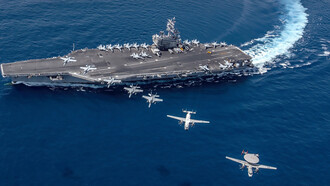I. The year 2019 will be characterized by a shifting mix of two forms of leadership that Plato once called Timocracy and Plutocracy way back in 380BC.
Timocrats represent mediocre, yet highly motivated and self-proclaimed “patriotic,” political leaders who generally believe that many of the world’s major problems cannot be resolved by diplomacy, but by the use of force, repression, and military intervention. These leaders claim that they act in accord with “honor” and “national values”. In opposing “appeasement,” and even negotiated compromise, they often act in accord with what they claim to be a “superior” morality. And because they believe that their values are superior to those of other states and cultures, and because they often act in accord with double standards, they believe they can be absolved of war crimes and crimes against humanity because they believe that their goals, even if accomplished by the use of extreme violence, are for the greater national, if not international, good.
What Plato once called “Timocrats” have merely changed their colors in the so-called post-modern, post-Cold geopolitical world. In the contemporary era, these kind of highly passionate, warlike, individuals have been dubbed “neo-conservatives.” The latter was an initially derogatory term framed in the early 1970s to depict American liberals and leftists who had suddenly switched to the right and who often became fervent ideological opponents of their former left-leaning comrades.
In addition to pressing for NATO enlargement into eastern Europe, neo-conservatives were the major political faction in the United States, who, along with US neo-liberals, pressed for the disastrous, ill-conceived US-led military interventions in Afghanistan in 2001 and then in Iraq in 2003, which resulted in the long-term occupation of both these countries the name of “democracy” and “freedom”, under the incompetent and demagogic leadership (you are either “for us or against us”) of President George W. Bush.
Both neo-conservatives and neo-liberals later pushed for the disastrous NATO military intervention in Libya in 2011, which has divided the country, and spread the influence of pan-Islamist movements throughout the region, under the neo-liberal leadership of President Barack Obama. Both neo-conservatives and neo-liberals have also sought the overthrow of the Syrian regime, resulting in direct Russian intervention to safeguard Bashir al-Assad’s leadership so as to prevent either the disaggregation of the country or else the rise to power of pan-Sunni Islamist groups that could further destabilize the wider region, which includes, from Moscow’s perspective, the Russian-controlled northern Caucasus.
By contrast, Plutocrats represent rule by the super-rich (or the “One Percent”) who try to manipulate the state to serve their own interests. These individuals generally advocate isolationism and oppose wars. While they generally believe in a strong national defense, and often seek to cut what they believe to be excessive non-defense and non-security-related expenditure, they may not uphold treaties and alliances or other inter-state obligations.
As compared to the patriotic and moralistic pretentions of Timocrats, Plutocrats are “amoral” and are less interested in “honor” and “values”. They generally do not seek to engage in “regime change” regardless of the horrific nature of another government’s domestic actions or behavior. Plutocrats rarely attempt to transform the nature of other governments and societies, at least by overt force, unless their interests are directly threatened. And they may be either “libertarian” or “protectionist” depending upon which policy they believe will best suit their interpretation of the national interest, which is often conflated with their personal interests despite their denials to the contrary.
And if diplomacy appears too complex, too costly, or seemingly impossible to achieve, they will argue for “appeasement” which meant “mutual compromise” in the 19th century—but which came to mean “capitulation” in the 20th century with respect to Neville Chamberlain’s failed appeasement policy toward Hitler’s demand for Lebensraum (living space). But Plutocrats could also opt for war if their rivals are seen as taking too great an advantage of their compromises and concessions. Thus, although Plutocrats prefer to stay out of conflicts where possible, they could nevertheless choose to engage in major wars when perceived vital personal/national interests are at stake.
II. From this perspective, it does not appear accidental that the Trump administration possesses a mix of Timocrats (such as the arch neo-conservative National Security Advisor John Bolton) and Plutocrats (such as Donald Trump himself). Since coming into office, the Trump administration has often flip-flopped between isolationist policies and threats of military interventionism, without a clearly defined global strategy.
Trump himself appears ambiguous and confused, as his complex personality appears to shift from one fixation to the next, now at least appearing to move away from Timocracy and toward isolationist Plutocracy in late 2018. Trump is a member of the American Plutocracy, a representative of the so-called “one percent” who was born into extreme wealth. Trump has additionally been accused of being a “chicken hawk”—someone who advocates the use of military force with others doing the fighting, but who does not possess any military experience. This accusation results from the fact that Trump was purportedly able to escape military service in the Vietnam war by obtaining a medical deferment, even though he was an excellent athlete at his university.
At the same time, Trump does possess a Timocratic background, in that he did attend the New York Military Academy (but only because he was purportedly pressed to do so by his parents after sneaking off to New York City against their permission once too often). But more importantly, Trump’s Timocratic side is revealed in his proclaimed admiration for maverick US military figures such as General George C. Patton and General Douglas MacArthur. These two American Generals were both known for opposing the orders of the chain of command and by acting in accord with their presumed superior instincts and war fighting skills.
In effect, given his admiration for Generals Patton and MacArthur, Trump represents a want-to-be authoritarian Timocratic leader who would like to serve at least three terms in office as the US president, if that were made possible by a Constitutional amendment.
Like Generals Patton and MacArthur, Trump believes that he possesses instincts that are superior to the bureaucrats around him, so he belittles the advice given to him by the State Department, the CIA, and the Pentagon, the FBI, as well as by his own chosen advisors when they strongly disagree with him.
Trump has continued to show off the Timocratic side of his bipolar Plutocratic/ Timocratic brain by opting for the greatest military buildup in world history—even if that nuclear and conventional weapons buildup is not quite as large as some Timocrats would like it to be. It is nevertheless a major military buildup that Moscow, Beijing, Tehran, Pyongyang and others, could soon find very provocative—that is, if Trump or his successor cannot soon begin to find concerted and diplomatic ways to engage in mutual compromises with US rivals.
III. The danger is that the changing mix of these contradictory styles of leadership, Timocracy and Plutocracy, augments the power and influence of other demagogues besides Trump throughout the world and leads to incoherent political decisions and actions, that, in turn, augment the chances for both domestic and inter-state conflict.
One of the reasons that the risk of war is higher in a time characterized by a shifting mix of Timocracy and Plutocracy is that demagogic leaders who are caught between acting and not-acting with the use of force do not always show absolute loyalty and may threaten to shift alliances at any time. This intensifies the rivalry among the major powers to gain the military and political-economic allegiance of lesser powers, while concurrently sustaining the allegiance of their own Allies.
As the Timocrats have overextended US military and political economic capabilities through NATO enlargement and the global war on terrorism, there is a risk that the Trump administration will, in 2019, go too far in the opposite isolationist direction and move toward an imperial retraction that seeks to significantly reduce the US military presence overseas—but without concurrently seeking ways to negotiate a resolution of these overseas conflicts.
In many ways, the post-Cold War Timocratic neo-conservative, neo-liberal policies have provoked the formation of a Russia-CSTO-China-Iran counter-alliance against the alliance of the US-NATO-Japan-Saudi Arabia. Both Russia under Vladimir Putin and China under Xi Jinping, who has been declared president for life, have been seeking to expand their alliance networks to counter US global hegemony while building up their own conventional and nuclear weapons capabilities against the US and their rivals.
Moscow and Beijing accordingly appear to be working together to sustain the close political-economic cooperation and military allegiance of Belarus president Alexander Lukashenko (among other members of the Collective Security Treaty Organization (CSTO), North Korean leader Kim Jong-un, Syrian President Bashir Al-Assad, Iranian Supreme Leader Ali Khamenei, Venezuelan President Nicolás Maduro, Nicaraguan President Daniel Ortega, and Cuban President Miguel Díaz-Canel (who took over leadership from the Castro brothers), among others.
For its part, the US and NATO members have supported Ukrainian President Petro Poroshenko in Kiev’s conflict with Moscow over eastern Ukraine and Crimea, after Moscow annexed Crimea in 2014. US support for Tokyo’s military resurgence under Japanese Prime Minister Shinzō Abe, and President Trump’s support for the potential “independence” of Taipei under the leadership of Taiwanese President Tsai Ing-wen, have pressed Beijing to move closer to Moscow. In the Middle East, the Trump administration has been attempting to forge an alliance between Saudi ruling Prince Mohammad bin Salman, Israeli Prime Minister Benjamin Netanyahu, Egyptian President Abdel Fattah El-Sisi, among others, against Iran and Syria.
At the same time, both Turkish President Recep Tayyip Erdogan and Philippine President Rodrigo Duterte have been threatening to shift their allegiance toward Russia and China—a radical shift in policy which would, if eventually enacted upon, weaken NATO and ASEAN solidarity and cohesion. By contrast, Brazil had previously been looking to strengthen its relationship with the BRICS states (Brazil, Russia, India, China and South Africa); yet under the newly elected neo-authoritarian President Jair Bolsonaro, who advocates the use of force to repress “internal enemies,” Brazil will most likely look to closer political economic relations with Trump and the US—in part to counterbalance its neighbor, a highly socially and economically instable Venezuela.
In this perspective, as global relations between US-NATO-Japan-Taiwan-Saudi alliance and the Russia-CSTO-China-Iran alliance begin to polarize, President Trump’s isolationist announcement in December 2018 to withdraw 2,000 US troops from Syria and 7,000 out of 14,000 US troops from Afghanistan will not necessarily be able to stop the ongoing conflicts in these regions. These US troop withdrawals, if actually implemented, could potentially encourage the Islamic State and the Taliban to continue fighting, while further destabilizing the balance of forces in each region, if the powers most concerned (Russia, Iran, Israel, Turkey in Syria and Russia, India, China, Iran, Pakistan in Afghanistan) cannot negotiate a peace deal (that excludes the US) among themselves.
On the other hand, if these conflicts do continue full-force and US maintains its troop presence, the overall situation risks overextending US military capabilities, while a US, Israeli, Saudi war with Iran could erupt at any moment—by accident, or accidentally on purpose. Such a war could break out precisely because the Trump administration did not support and fully engage in multilateral diplomacy intended to achieve negotiated permanent settlements in each region. Failure to thoroughly resolve these conflicts through concerted diplomacy with both the major and regional powers most concerned—while concurrently failing to avert the formation of two contending alliances—could eventually result in major power confrontation.
Plato had argued that rule by Plutocracy would result in an ever-increasing gap in wealth and power between the rich and relatively poor—a dynamic that could potentially cause both domestic and international conflict. Plato also warned that a Timocratic era would be prove very “peculiar” with the emphasis of its mediocre, yet morally passionate, elites upon military stratagems and contrivances. The danger is that a mixed Plutocratic/ Timocratic era—which flip-flops between demands for isolationism and demands for military interventionism—could lead to brief periods of truce and followed by even wider and wider conflicts without end.…















